Does anyone here have any experience with Emmanuel Hadjiandreou's 100% rye with coriander & orange zest from How to Make Sourdough?
It came out OK, but I'm disappointed in the flavor, which seems to lack many of the things I've come to expect in high %age ryes. It doesn't have the delicious carmelized crust that I've gotten with some of TheRyeBaker's recipes. And it doesn't have a distinctive or complex sour flavor.
The recipe calls for a levain of 100 g of rye starter / 150 grams of rye flour / 200 g of water.
To which, after at least an 8 hour ferment (I did 12 hours), you add 200 g of rye flour / the zest of one orange / 2 tsp of crushed coriander seeds / 6 g of salt / 150 g of just boiled water. That mix proofs on the counter for 1.5 to 2 hours (I did 1.75) and is baked in a 425F oven, with steam, for 40 minutes (mine took 50 -- I steamed for the first 20.)
The 1st time I baked it, I got interrupted and had to refrigerate the levain and then resume work with it later. The final bread was way underfermented -- and that slightly vaulted crust was a huge air pocket over a dense biscuit.
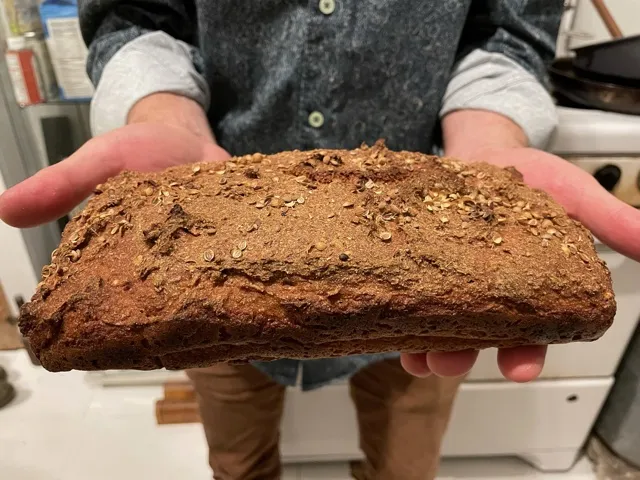
Last night, I did much better
Image
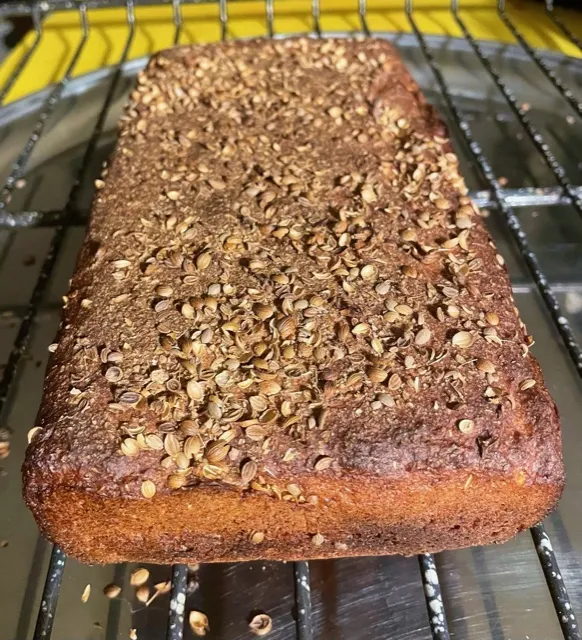
But the book claims the bread should be bursting with flavor and I'm just not feeling it.
I have a theory that the large amount of starter in the overnight levain doesn't help the bread develop all the complex features I've come to expect in ryes. But maybe I'm just doing things wrong. Or maybe I'm looking for the bread to be something it's not designed to be.
Thanks for thoughts.
Rob
or How to Make Sourdough?
I do have his How To Make Bread book but I don't think it's in that one. I'm curious what the recipe is as rye with coriander and orange zest should be very flavourful. And an overnight levain should bring with it lots of flavour. I'm thinking somethings gone wrong somewhere. Care to share the recipe?
is in my post. But to repeat:
levain: 100 g rye starter/150 g rye flour/200 g water
ferment at least 8 hours
final dough:
levain + 200 g rye flour/zest of 1 orange/2 tsp crushed coriander seeds/6g salt/150 g hot (just boiled) water
proof: 1.5 - 2 hours
bake at 220C/425F for 40 min.
is in my post. But to repeat:
levain: 100 g rye starter/150 g rye flour/200 g water
ferment at least 8 hours
final dough:
levain + 200 g rye flour/zest of 1 orange/2 tsp crushed coriander seeds/6g salt/150 g hot (just boiled) water
proof: 1.5 - 2 hours
bake at 220C/425F for 40 min.
is How to Make Sourdough - https://rylandpeters.com/products/how-to-make-sourdough - from 2016, I think.
Scanned your question quickly. Now I have time to delve into it more. I have his book "How to Make Bread" but not his second book "How to Make Sourdough".
One thing does spring to mind is your bread is very flat. Is it supposed to be baked in a loaf pan? And if it has a cavern then there's some issue in the ferment. Emmanuel does have some very nice recipes and with this being rye with coriander and orange zest to-boot I can't imagine it not being a flavourful bread.
I'll take a closer look at the recipe.
acc to the book, it is supposed to be in a loaf pan. Indeed, it does its final rise in the pan. My successful bake last night doubled as it proofed but didn't get any oven spring. I'm used to 100% ryes being super tasty -- even on the first day after baking (though, clearly, the flavor will deepen over time) -- so I was surprised by the flat character of this one.
but straight off the bat I see just boiled water. I've seen this in another one of his rye recipes. The method here is important when you add it to the rest of the ingredients. If it's the same principle then you need to completely cover the the levain with the fresh flour and other ingredients before carefully pouring the boiling water over the mixture.
I thought abt this -- tho he does not caution about it anywhere in the book -- and was quite deliberate in how I added the boiling water. I hoped I had dodged the bullet when the dough rose while proofing.
and you are right... he has used the same method in two recipes. However in the Raisin Rye recipe he is careful to advise on the method and in this recipe he doesn't.
Excerpt from his Raisin Rye Bread in "How To Make Bread" (his first book)
In the recipe you are following you want a 1lb loaf pan and this will help you judge the rise too. If your dough is spreading too much it will be difficult to tell when it's done. The cracks won't show as much.
I recently did Denisa's 100% rye, with a 10 hour levain build, 1 hr bulk ferment, and 1.5 hr proof.
Though she said wait 24 hours, I tasted it at 5 hours after baking and was similarly disappointed. But then at 30 hours, the flavor was so much better.
--
Toasting the coriander before crushing also helps.
i probably should have toasted the seeds. And, yeah, ryes change over time. I'll taste it again tonight & tomorrow morn. Thx.
would make the biggest difference. My first thought was that the pan was too big. Try a smaller more narrow pan (or double the recipe and bake longer.)
Interesting 100% hydration rye with a scald. (Assuming rye starter is 50/50. There's 400g flour and 400g water in the dough.) If you find the batter too thin, cut back a little on the water I wouldn't go below 83% hydration or 333g water. 340g total sounds good too. Just a note to say this is a flexible recipe, you might have to adjust to the particular rye flour on hand.
Don't be afraid to fiddle with the recipe. I can invision soaked or boiled seeds and whole grains ,nuts dried berries going into this basic recipe. Walnuts and craisins love orange undertones just to name one variation.
I'm temped to give the recipe a whirl. Love to see how warm the dough gets after the flour and scald addition. I will multiply ingredients by 1.5 for my pan.
the first thing I thought when I decided to try this recipe was: 'wow, 100% hydration.' I was prepared for rye pancake batter but, amazingly, the final dough was not liquidy at all.
I didn't consider the size of the pan when I bought it - but a smaller one (or larger dough) would make sense.
I wonder, also, if it might be appropriate to do the scald on the final dough's dry ingredients, let it cool a bit, and then add it to the levain.
The biggest issue for me, though, is the flavor. This formula, though 100% rye, just hasn't brought the rye profile forward. I enjoy high percentage ryes for the complex variety of tastes -- sournesses like plums or cherries, hints of malt sweetness, and, often, far out spiciness though no spices have been added -- and this bread just hasn't delivered so far. I'm not ruling out seeds and all -- but first I'd like the rye flavor to sally forth with gusto.
I speculated in my initial post as to whether the large amount of rye starter in the pre-ferment might mean the fermentation is not getting a chance to produce the right balance of acids & to rearrange the starches in a way that will draw out the flavors. I still wonder if this could be true.
Rob
right now. I am trying so hard to follow it. Did multiply all ingedients by 1.5 to make about 1.2 kg dough. Got the preferment fermenting with 10g active rye malt to speed it up a little bit. Somehow I didnt innoculate enough flour for the preferment but after figuring what I needed to make my overnight preferment larger, I am now waiting out this almost doubling of the starter/preferment which should only take a few hours instead of starting over or being up all night. I buttered my rye pan and dusted it with fine grated walnuts. Walnut are especially good with a new rye starter, adds a little complexity that is nice until the rye starter is older. Even then...nice.
Recipe x 1.5 :
Preferment: 225g rye flour, 150g sourdoug starter 100% hydration, 300g water.
Dough: 300g Rye flour #960, 10g spice, 20g zest pureed with 20g of the rye flour to ease chopping :) 11g salt, 225g boiling hot water.
Like I mentioned, I accidently had only 250g starter/preferment instead of 675g total, so I took this very ripe starter and added 175g rye and 250g water to bring it up to the recipe. While I'm waiting, put 125g rinsed barley with the same volume water above the grain and into the rice cooker It went, 2ish grams salt and a pat of butter. Depending on how it comes out, might add to the dough. Ooo, carmelized just a little bit and smells good. Tastes good too!
Image
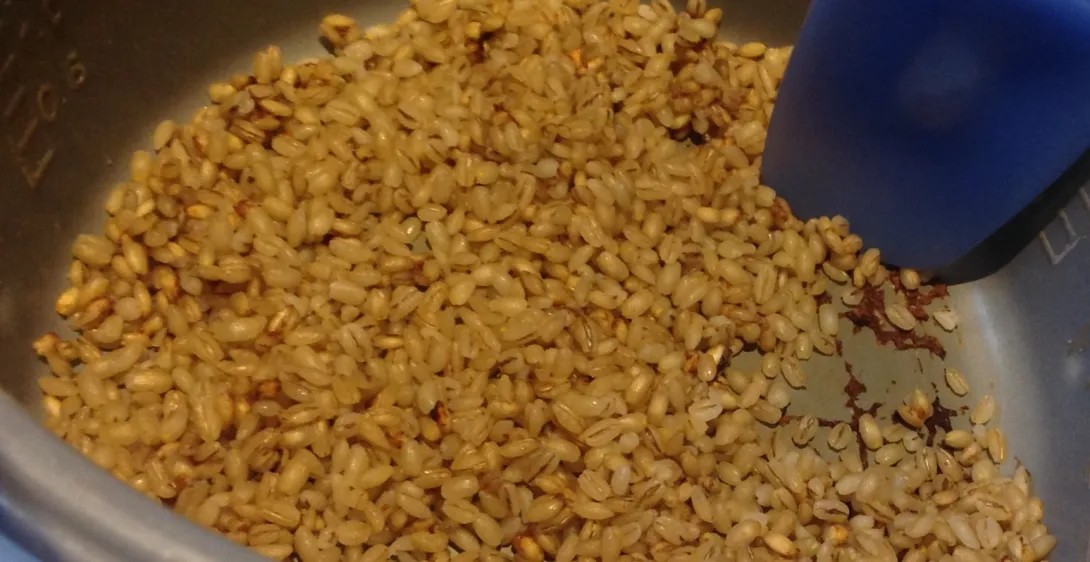
Oh that was fun! Put a nice thick one inch layer of flour and dry ingredients on top of the bubbly risen preferment and put my measuring cup on my scales. Set to zero and poured boiling hot water into the cup. Then poured the hot water all over the top of the flour. Started to stir the loose flour and water and then dove down to blend everything together. So easy! I stuck a few fingers into the flour and mixture just to see how warm it was. Lovely! (Wouldn't mind mixing a big vat of the stuff with my hands and crawl right into it.) the heat dissipates fast so don't worry about it at all.
I would do the first few stirs with a sturdy spoon or spatula first. I decided to add 170g of the precooked and caramelize whole barley into the dough once all the flour was moistened. This is a nice sticky dough, creamy sticky and easy to control. Keep to the spatula filling the loaf pan and use a second spoon or stick scraping off dough into the pan. Try not to touch it without wetting your fingers first. After the dough is in the pan and pretty much heaped and shaped. Clean off dough from spoon onto the dough and then wet the spatula or card to shape dough further. Only need a little water just to slide acroos the rye mud.
Image
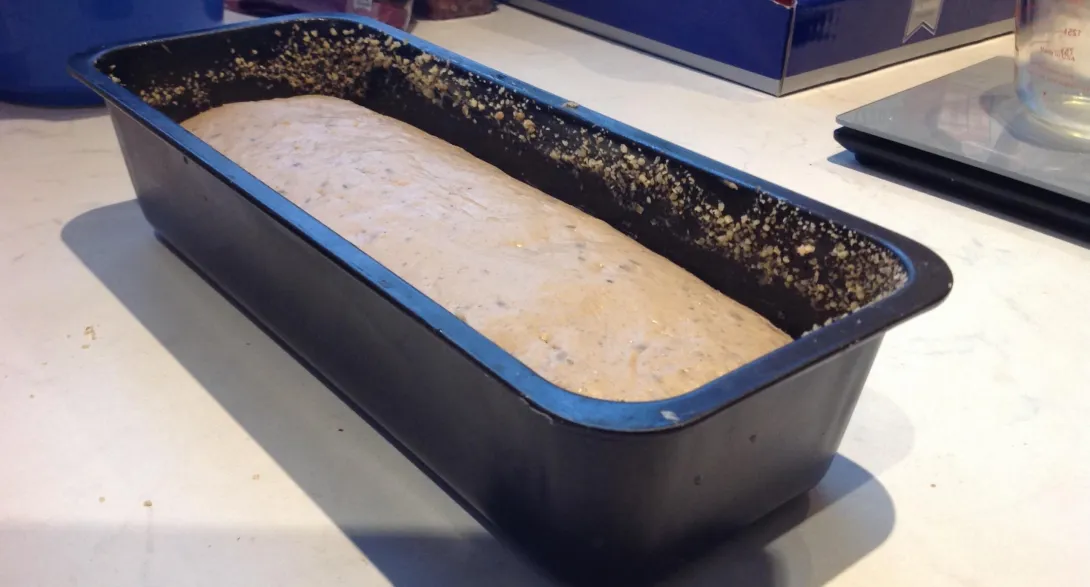
Mmmmm, Mini. You're making me hungry.
You may have seen my 3rd venture with this formuls, which I posted in the rye Community Bake thread. I followed your & Abe's able advice and got a good result. My one failure was that I only boosted the recipe by 25% & that still wan't enough for my way-too-big loaf pan. Still, a tasty horizontal rye is better than no rye at all.
Your walnut and barley add-ins sound superb. Enjoy!!!
Rob
my pan is 30x11cm at the top tapered downward Rose fast. I made a double aluminum tent to be removed in about half an hour. In ten minutes plan to turn the tmp down to 220° C. From 240°C. It looks great, a little pinholing, and have cracks running lengthwise down the loaf surface. Didn't score. Did spray the loaf twice with water as it had dried out to the touch.
Image
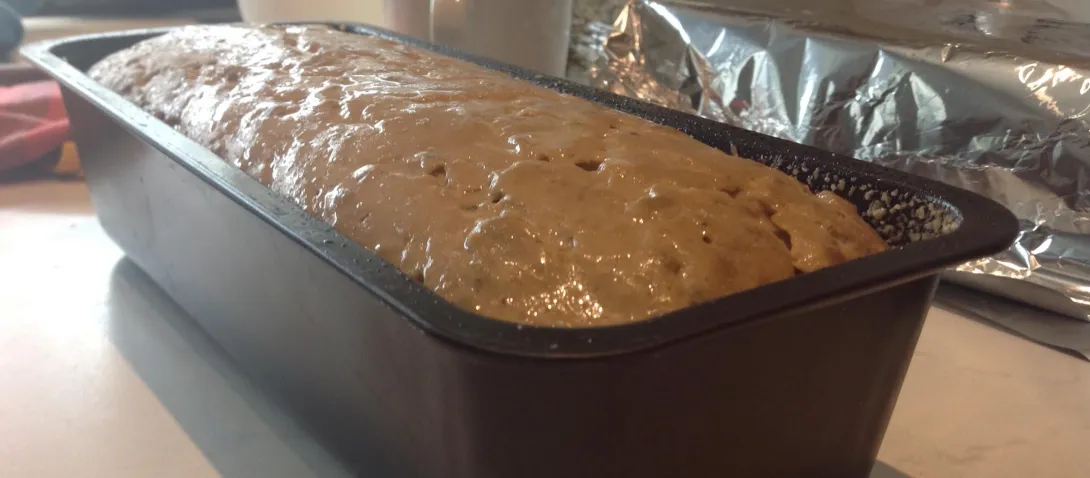
Orange is a lovely flavour in Rye. Looks like a good dough size for pan used. I've tried the hot water approach used in this recipe and it's like rye on speed. It goes a bit crazy. I would have thought the very hot water would stun it a bit but just the opposite. Looking forward to the final loaf, Mini.
Looks fantastic so far, Mini. I got a good rise while proofing, but mine fell in somewhat while baking. I'm looking forward to seeing the pics from when you pluck it from the heat.
Rob
Perhaps you overdid it Rob. If it fell during baking then it was over proofed. And it wouldn't help that you used a very large pan, too big for the dough, and it had little support. That can easily be corrected.
Good points, Abe. For me, it's double the recipe or halve the pan. --Rob
grains, I would venture to multiply the base recipe (800g) by 1.7 . The pan when empty,holds 2000g water. In the oven there was a little spring filling in the sides of the pan flush with the pan rim. There is still a domed loaf and it is 40 minutes in there now. 10 more min. Smelling very orangy rye but just doesn't look done yet. Might be the barley weighing it down. But do I care? Heck,no! Smells terrific btw. Think I will goose it with a thermometer just this once. ....98°C. Middle of the middle. Cooling on rack...
Image
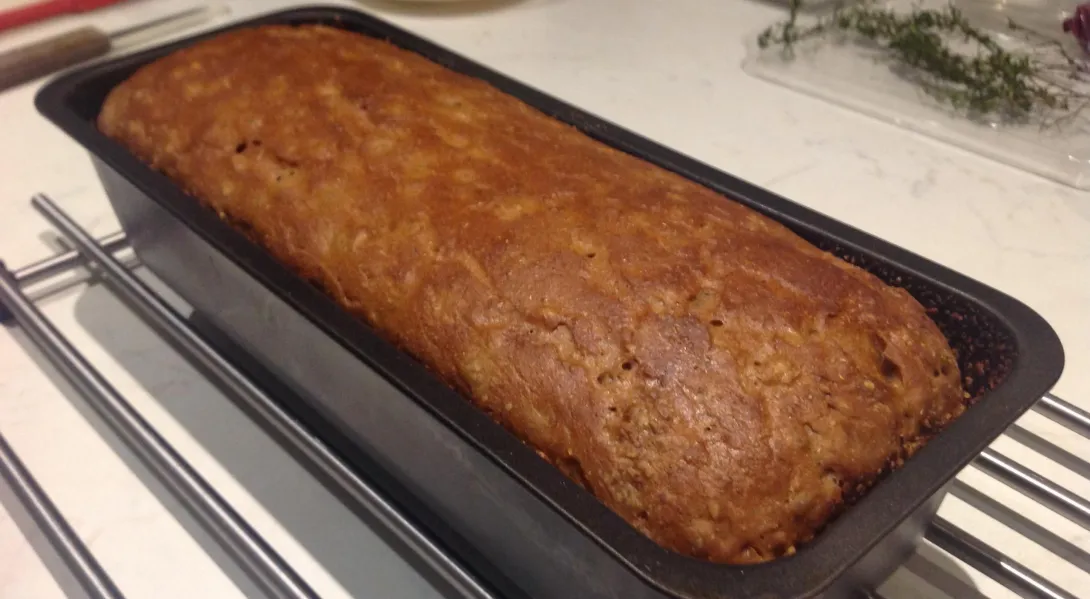
Lovely colour on that loaf, Mini. I once swapped out orange zest for marmalade and got excellent results in both flavour and crumb. I'm tempted to do it again.
What a good oven spring for 100% rye.
in volume. :)
fantastic!
the whole grain barley does add a "bite" to the texture but otherwise a nice moist loaf. I would bake it again without hesitation. I expect the grain in the crust to soften after 24 hrs when wrapped tightly. Excellent with both savory and sweet.
Image
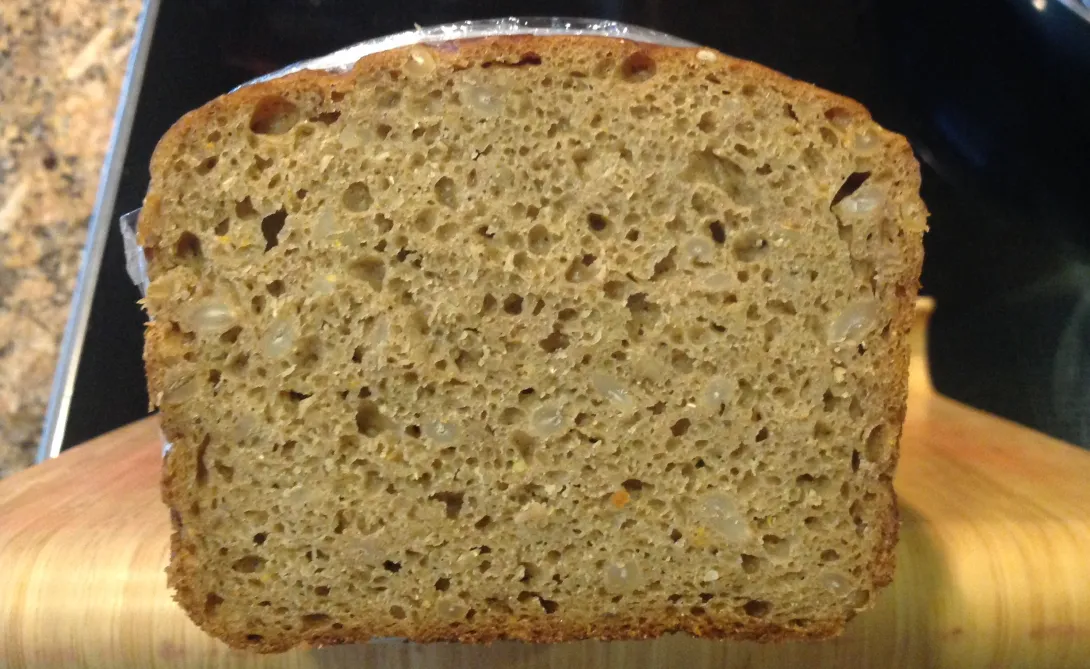
Such a good rye crumb structure. Your rye seems to be a lighter colour than wholegrain. I can imagine the barley giving it a nice bite. Very nice indeed.
Lovely bake Mini, and that crumb looks beautiful.
Benny
Absolutely amazing, Mini.
one question: I'm confused by the hue. Is that the barley that lightens it so much?
looks quite pale. Hubby said the same. The loaf in real life looks a little darker but still could have been darker. Maybe too close to the light source. Lets give it time and I will duplicate the same lighting and see if the crumb darkens over the next few days. I might have to hide some loaves as hubby is carving up this loaf quickly. Me too. That 10 g of dark active malt does add darker color, normally. (Turns a white bread tan.)
Why my colorful barley turned almost white is another mystery. Aliens? I think the caramel color transferred to the rye. Hmmm. Grain can be clearly seen in the crumb. The barley in the crust is another story, still light brown.
With the large gap and pinholes, I was worried the dough might be overproofed after two hours in the pan. Crumb was a nice surprise. Even browning all around the edges. I'm very happy with this formula and I like the fun of pouring hot water over the flour in the final dough mix. I've seen many videos where the scald was done in the beginning when first mixing up the dough, long before yeast and a bulk rise, but this is a nice twist. I'm sold. Try it, y'all!
The question about starter builds. Step builds like this recipe will give a milder tasting end sour even with a hefty sour tasting preferment. This loaf is rather mild in the sour tasting department. I think that's why "Mr. White Bread" likes it so much. It really is an easy recipe to make. I dirtied two bowls (no kneading) one spatula and a soup spoon. Oh, and a thin cutting vegetable peeler and my magic bullet chopper. (I see one tiny bit of orange peel in the crumb shot.) I thought the bread might taste bitter but it didn't. Did add zest from one large tangerine for my 600g flour.
Thanks for posting the recipe. ❤️
I agree it's an easy recipe....which didn't stop me from messing it up. Thanks for sharing all your thoughts.
on a scales and filled it with water? What weight do you get?
Looks really good Mini and I like the whole grain barley addition! It's one of my favorite grains and use barley flour whenever I can in a recipe.
Mini I really appreciate your notes on what works with what. That's the kind of stuff that gives flight in a sensory and experiential way. Your bake looks wonderful.
And OP thanks for the thread! I'd never come across the author, much less this bread which, I agree Abe, sounds wonderful in its combination with orange. I've got the sourdough book on my cart - do you also recommend his other book?
I'm a relative newcomer to this obsession and have read many of your encounters with and descriptions of breads with awe. So I don't know if my thoughts will add anything. But here goes:
This was the first bread I made from How to Make Sourdough. Yesterday I tried the recipe for baguettes.
So far, Hadjiandreou's formulas seem less intuitive to me than some others. I can make my way around most of the stuff I have tried from The Rye Baker blog. I can sort of sense what the purpose is when he prescribes a 2-stage levain and what the dough is doing at each step. And I have had fun -- and made some not-too-shabby bread -- by following quite a number of formulas people have shared here on TFL.
This lack of intuitive sense can be good: I'm learning, expanding my repertoire. But it also means I have to be rigid if I want good results -- taking care to do everything exactly as instructed.
Also, the book doesn't really help build my understanding: why a scald in buildup of this bread? Why a high amount of starter in certain preferments and a low amount in others? I'd prefer to deepen my comprehension and not simply to follow formulas by rote.
Of course, I haven't played with many of the recipes. So this is just a first impression. As Mini just showed, even with some personal tweaks, in the hands of a master, the bread that I struggled with came out just fine.
Rob
https://www.thefreshloaf.com/node/50750/exploring-rye-breads
I think it's a matter of getting the timing just right and using the correct loaf pan.
in reading the introductory part of the book, I see that when he writes, in the recipe, proof 'in a warm place,' what he really means is a hot place -- as he starts his proofs in an oven preheated to 50C/150F & then turned off. As I've been leaving the dough to proof on my counter, I probably need to double or triple the time -- so maybe six hours instead of two.
Rob
to be a very tasty loaf. And look at the size of the loaf pan he/she uses. It's the only way to really judge this kind of rye properly. As for time it'll be however long it takes to see cracks and little airholes appearing on top of the dough. Watch the dough and not the clock. I think try this recipe again sticking as close to possible to recommended temperatures and the timings should fall into place. Do a build for your starter like so...
Overnight and use when peaked.
Make the pre-ferment and keep at recommended temperature for about 8 hours. Longer if cooler.
Make the final dough using the method he explains in the other recipe. Can't be too careful and i'm sure it'll work just as well even if not necessary.
Portion out into a small loaf 1lb pan. And bake when the top of the dough shows some cracks and small holes just begin to appear.
Best of luck Rob. I'm following your thread and look forward to seeing your results. I've got one rye loaf to use up but I aim to make this next.
Should all go well then you can think about making it your own incorporating some great ideas from Mini.
dough and at the same time help incorporate more moisture. So 100% hydration is doable. If the scald is allowed to cool too much the gel may stiffen and be too thick to get it smoothly mixed into the dough. It may also be esential to warming up the bowl and dough mixture underneath the flour. The scald cools soon after hitting the flour and the sides of the bowl, air etc. especially if the flour is cold from a winter pantry.
Abe is right on target with his good advice, :)